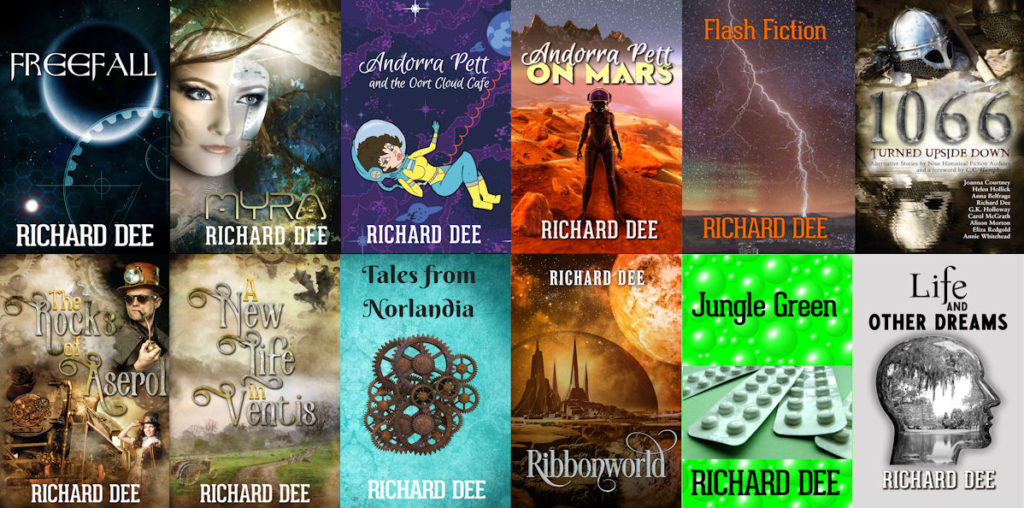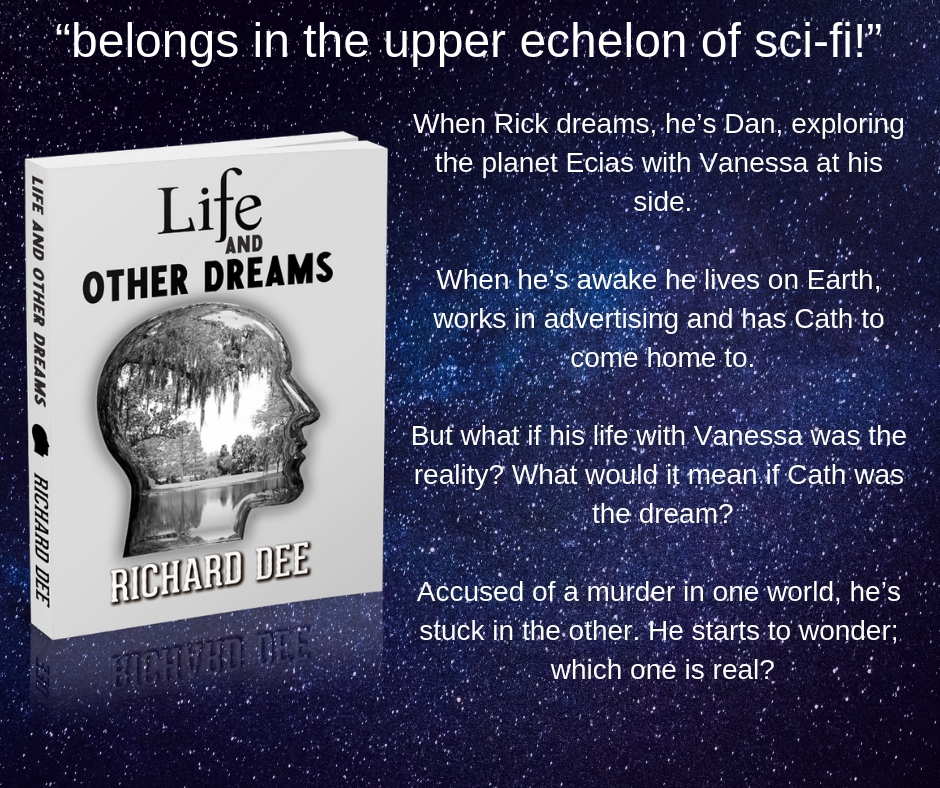 My guest today is Richard Dee who writes science fiction and steampunk adventures, as well as chronicling the exploits of Andorra Pett, reluctant amateur detective. When he’s not writing, reviewing or blogging, he bakes bread and biscuits, cross-stitches and walks the Devon coast.
My guest today is Richard Dee who writes science fiction and steampunk adventures, as well as chronicling the exploits of Andorra Pett, reluctant amateur detective. When he’s not writing, reviewing or blogging, he bakes bread and biscuits, cross-stitches and walks the Devon coast.
His first novel, Freefall, was published in 2013, followed by Ribbonworld in 2015. September 2016 saw the publication of The Rocks of Aserol, a steampunk adventure, and Flash Fiction, a collection of short stories. Myra, the prequel to Freefallwas published in 2017, along with Andorra Pett and the Oort Cloud Café, a murder mystery set in space.
He also contributed to 1066 Turned Upside Down collection of alternative history stories (where I ‘met’ Richard). Currently, he’s working on prequels, sequels, and a few new projects.
Over to Richard!
“Thank you, Alison, for the chance to post on your blog.
Write what you know, they said. They didn’t say how you were supposed to do that when all you wanted to write about was the future, about places that, as far as we know, don’t exist (yet).
Now you could be forgiven for thinking that writing about places that don’t exist is easy, after all,you don’t need to do any research, you can just make it all up as you go. Right?
Wrong. That was the first thing I found out, if you want to write about tomorrow, you have to have a pretty good idea about today. Not only that; you need to know about yesterday as well.
You see, there’s a little thing called realism. It’s a pesky nuisance but there you are. In the words of Isaac Asimov. Nothing has to be true, but everything has to sound true.
What that means, at least as far as I’m concerned, is that everything I create must be based on a fact. My story can head off into the future, on Earth or any place that I care to imagine, but it all needs to start with something that the reader can understand and relate too.
It can be a familiar thing, take my novel Ribbonworld, for example. It opens in a hotel room; they will have them in the future and you can bet that they’ll be roughly the same as they are now, only their location will have changed. Immediately, I’ve introduced you to something you can relate to. Now I can get you involved in what’s going on in the room, and then; wham! I pull open the curtains on a scene that no-one has ever witnessed before and takeyou into the action.
Or I could start with a piece of science, how about the fact that pressure drops when flow increases. Even if they don’t understand it, everyone uses it (it’s one of the principles that can help you get to that hotel room). With a bit of a twist, you can warp the science and use it to justify travelling faster than light.
Or, how about a problem that you need to solve in your future world; for instance, what do people on a space station eat? The obvious answer is that they survive by growing their own food. Of course, that brings its own difficulties; it’s up to you to justify it in a logical and realistic way that makes it feel like a natural part of your setting.
I guess what I’m trying to say is that whoever gave the advice was right. Writing about the future has to start withwriting what you know and showing that you know it thoroughly. Once you have the audience convinced, you can tweak it and expand it to fit your vision. You just have to blur the point where the reality ends and the fiction starts.
However, there is one thing about the future that I do know; whatever happens and wherever we go, we will take all our vices, emotions and behaviour with us. In the worlds of the future, there will be good guys (pardon my gender-type) and bad ones, the selfish and the selfless. All human nature will be our companion. Our adventures will play out on a wider stage.
My latest novel explores one man’s life, he appears to exist in two places; which one is real?”
Thank you, Richard. As a science fiction reader who writes alternative history fiction, I completely endorse your advice!
Connect with Richard
Head over to richarddeescifi.co.uk to see what he gets up to, plus free short stories, regular features on writing, book reviews and guest appearances from other authors.
Facebook: RichardDeeAuthor Twitter: @RichardDocket1
Life and Other Dreams is available now.
Alison Morton is the author of Roma Nova thrillers INCEPTIO, PERFIDITAS, SUCCESSIO, AURELIA, INSURRECTIO and RETALIO. CARINA, a novella, and ROMA NOVA EXTRA, a collection of short stories, are now available. Audiobooks are available for four of the series.
Find out more about Roma Nova, its origins, stories and heroines… Download INCEPTIO, the series starter, FREE as a thank you gift when you sign up to Alison’s monthly email newsletter.















Thanks for hosting me on your blog.
An absolute pleasure, Richard. Good luck with your book!
This is very interesting, Richard. I am starting to write a dystopian novel and I thought your message here made absolute sense.
Hi and thanks for your comment. I’m glad you can see what I was trying to express. Good luck with your new project.